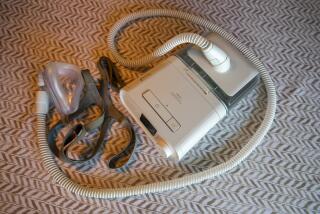Heart Valve Maker to Notify Patients of Possible Defects
- Share via
Consenting to the demands of a consumer group, heart valve manufacturer Shiley Inc. of Irvine has agreed to notify patients who have received the surgical implants of potential defects that could prove dangerous.
Shiley, a subsidiary of New York-based Pfizer Inc., said it is developing an “innovative, far-reaching program” to identify about 21,000 people in the United States who were implanted with the Bjork-Shiley, 60-degree “convexo-concave” heart valve.
Shiley said its program is intended to “promote patient awareness of the signs and symptoms of the serious or life-threatening complications associated with all mechanical valves and the steps to be taken in the event emergency treatment is required.”
Shiley’s action was in response to concerns raised by the Public Citizen Health Research Group, a Washington-based consumer group that for years has demanded that Shiley notify patients of the possibility of the valve’s failure and advise them of what to do if it does fail. Shiley voluntarily recalled the valves from the U.S. market in 1986--about five years after the first reports of life-threatening valve fractures.
In July, Public Citizen, which was founded by Ralph Nader, asked the Food and Drug Administration to order the company to warn patients. The FDA has not yet acted. Earlier, the consumer group filed a lawsuit against Pfizer and Shiley, seeking a court order requiring the company to send warnings to patients. The suit was dismissed in May after a judge ruled that the FDA had sole authority to issue such an order.
Dr. Sidney Wolfe, director of Public Citizen, said the Shiley program is long overdue. “I think they (Shiley) saw the handwriting on the wall and yielded to something they should have done a long time ago.
“If the company does what it says it is going to do,” Wolfe added, “there is no question that some people who otherwise would die will live.”
Shiley and Pfizer previously had notified only surgeons and other physicians about the valve’s problems. The idea was that physicians would inform their patients. In March, Shiley launched an expanded mailing that included not only surgeons and cardiologists, but also primary physicians and emergency-room practitioners.
Shiley said in a statement that it decided to notify patients directly in response to FDA concerns “that physicians may not always have transmitted the information they have or may not have done so in an effective manner.”
The FDA has been holding public hearings since March on whether to change its policy and require notification to patients. A decision on that matter is expected early next year, said Susan Cruzan, an FDA spokeswoman.
Shiley said it will ask the FDA to review any notices it sends to patients.
Roger Sachs, vice president and medical director for Shiley, said in an interview Tuesday that the company is still determining how the patient registry will be compiled and how patients will be notified. He said the company is negotiating with an outside contractor to do the investigative work, which he says will be extensive.
“It will be very difficult to find patients,” Sachs predicted. He said the hospitals who surgically implanted the valve have returned to Shiley only half the “implant cards” that identify valve recipients. He added that the company currently has the names and addresses of only a few hundred valve recipients.
He said it will begin working with doctors and hospitals this month to track down the rest of the recipients.
Shiley initially does not plan to notify an estimated 30,000 to 35,000 patients outside the United States who have either the 60-degree valve or a 70-degree valve that also is a potentially defective device. The 70-degree valve was sold only outside the United States. If the U.S. notification program is successful, the company may expand the program overseas, Sachs said.
Public Citizen’s Wolfe said patients who otherwise did not know of the valve’s problems now will be able to advise friends and relatives on procedures for getting them to the proper hospital in an emergency.
Citing information compiled by the FDA, Wolfe said that as of July 6, 395 Bjork-Shiley valves have fractured, resulting in the deaths of 252 people.
More to Read
Inside the business of entertainment
The Wide Shot brings you news, analysis and insights on everything from streaming wars to production — and what it all means for the future.
You may occasionally receive promotional content from the Los Angeles Times.








